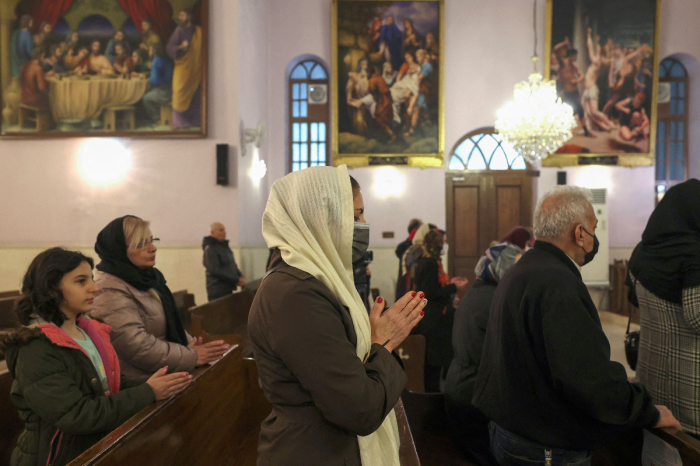One-third of Christians arrested in Iran targeted for possessing multiple Bibles: report

Christians in Iran faced a surge of arrests in 2023 as authorities appeared to target Bible distributors in particular, according to a new report from leading persecution monitoring organizations. One-third of those arrested possessed multiple copies of the Bible.
The advocacy groups Article 18, Christian Solidarity Worldwide, Open Doors and Middle East Concern released a 2024 joint annual report on Monday analyzing the various ways the Iranian regime targets religious communities, including Christians, subjecting them to arrests, fines, and floggings.
"Despite a comparable number of Christians being arrested in 2023 as in previous years — 166 arrests were documented in 2023, compared to 134 in 2022 — fewer names and faces could be publicised," the report stated.
The arrests came in "waves," the report said. Authorities arrested a handful of people before June, increasing to over 100 arrests within three months over the summer and a "further rash of arrests during Christmas."
As the report noted, few of those arrested agreed to publicize their cases, which led to an increased number of "faceless victims."
"By the end of 2023, at least 17 of the Christians arrested during the summer had received prison sentences of between three months and five years, or non-custodial punishments such as fines, flogging, and in one case the community-service of digging graves, on charges of 'propaganda against the state,'" the report explained.
Steve Dew-Jones, the news director for Article 18, a London-based organization that specializes in monitoring persecution in Iran, told The Christian Post he does not believe it's a coincidence that the arrests in 2023 took place in the months leading up to the anniversary of the death of Mahsa Amini.
In 2022, protests erupted in Iran after the Islamic Republic's "morality police" arrested 22-year-old Mahsa Amini for wearing her hijab improperly. The young woman later died in custody after she was beaten to death.
"We do believe it was deliberate," Dew-Jones told CP, noting that Christians who had recently been released from prison were instructed not to partake in any protests. "The regime has its methods for staying in power, and they're pretty ruthless."
In Iran, conversion from Islam to Christianity is illegal, and anyone who is found to be a member of a house church can be charged with national security crimes and sentenced to long prison sentences, according to Open Doors' World Watch List. While traditional Christian communities, such as Armenian or Assyrian Christians, are more likely to be tolerated, they are often treated as "second-class citizens." Additionally, Iranians are not allowed to read the Bible in the nation's predominant language of Farsi or support Christian converts from Islam.
When asked if things in Iran have become worse for Christians following Amini's death, the news director replied that this is a difficult question to answer. While he noted the numbers in the report for the most recent year are higher, Dew-Jones said this could be due to more arrests, or it could mean better documentation of arrests.
The advocate stated that the level of persecution has been "fairly consistent" since 2009, which is when the regime subjected churches to increasingly restrictive controls. Dew-Jones noted that while things certainly do not appear to have improved for Christians since then, he cannot say for sure whether things have worsened.
One of the trends highlighted in the report that the news director found the most surprising was the targeting of Bible distributors. He said the research found that over one-third of the arrests targeted individuals who possessed multiple copies of the Bible.
"We documented quite a few of those cases over the years, but I hadn't ever assumed that it would account for as many as it did last year," he said. "So that was a surprise for me."
Another section of the report analyzed how many Christians reported that they continued to face harassment and monitoring after their release from prison. One witness cited in the report said that an intelligence agent frequently watched their home, while others recalled receiving "distressing" phone calls from their interrogator.
"For other Christians, the monitoring can be more subtle, such as through continuous surveillance of online activities," the report stated. "Several Christians have testified that during their interrogations, they were surprised to see piles of print-outs of personal emails or other telecommunications, which were later brought before the judge as evidence of their Christian activities."
Other forms of discrimination cited in the report include denial of employment, new charges, or a reopened case, all of which the document noted "make[s] it increasingly difficult for Christians to remain in Iran."
The advocacy groups included recommendations in their report for the Islamic Republic of Iran, as well as actions for the international community to take to hold Iran accountable.
For the government of Iran, the report recommends that it "release immediately and unconditionally Christians detained on charges related to their faith or religious activities." In addition, the advocacy groups instructed Iran to clarify "where Persian-speaking Christians may worship freely in their mother tongue, without fearing arrest and prosecution."
The report urges the international community to hold Iran "accountable for failures to fulfill its obligations under international law." Countries that receive refugees are also encouraged "to expedite resettlement for Iranian Christians currently resident in Turkiye, where there is a high risk of refoulement."
Samantha Kamman is a reporter for The Christian Post. She can be reached at: samantha.kamman@christianpost.com. Follow her on Twitter: @Samantha_Kamman




























